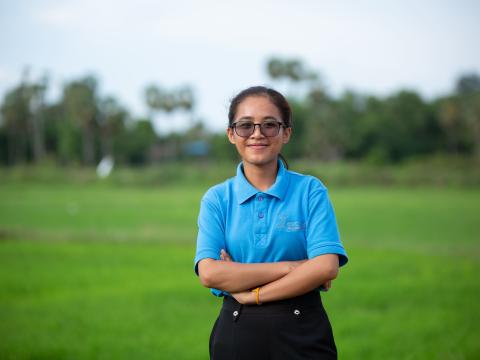From Sponsored Child to Community Leader: Seng Hun’s Journey in Baribour

Through youth clubs and community projects, Seng Hun developed confidence and leadership skills, a 15-year personal journey that reflects the transformation of Baribour village.
Baribour village was facing immense hardship in 2010, with only 2% of households having proper latrines, stunting among children under five at 43%, and classrooms overcrowded, with nearly 50 students per teacher. Families lacked access to clean water, and domestic violence remained widespread.
For Seng Hun, these challenges shaped her early childhood. But her life changed when World Vision introduced the sponsorship programme in her village.
“I became aware of World Vision when they began developing my community. As a 12-year-old sponsored child, I joined many fun and meaningful programs. We had community meetings, made Om Touk and Christmas cards, and took part in group gatherings,” said Seng Hun.
“I was chosen as a youth volunteer. Joining the Community Accountability Group and the Youth Leader Group helped me become confident and brave, qualities I never had before,” she says.
After finishing grade 12, Seng Hun continued volunteering, later joining another NGO, and eventually became a full-time employee with Exceed Worldwide. Her growth was not in isolation, leaving a ripple effect of World Vision’s presence with Community leaders.
“Before World Vision’s arrival, parents did not value education, and children were less motivated to study. But today, parents encourage their children to attend school and even teach them at home. Study clubs and training courses created with World Vision’s support have completely changed how families think about education,” according to Chea Channet, a commune councillor.
The transformation Seng Hun witnessed as a child is now visible everywhere in Baribour. Today, 100% of households have access to improved sanitation, compared to just 2% in 2010. Stunting has dropped from 43% to 19%. Nearly every child has a birth certificate, and positive discipline has replaced harmful practices in most homes.
These initiatives increased household income and improved food security, ultimately ensuring children had healthier lives. “World Vision taught me about agriculture, planting crops, and raising animals like crickets, chickens, and pigs. There were so many trainings, I can’t name them all,” said Seng Hun’s mother, who also benefited from training.
“More people are now coming to access medical services than ever before, and pregnant women visit doctors regularly for checkups. Women who used to give birth at home now deliver safely in health centres. Our staff also received training, which improved the quality of services,” said Tam Rany, Director of the Health Centre
“The impact of World Vision’s programmes was reinforced by collaboration with local authorities. Farmers applied the techniques they learned in cultivation and animal raising, and they now see excellent results. This has helped families build a better financial state,” said Yem Oeu, Director of the Office of Agriculture.
“When World Vision began its support in our community, every child gained the opportunity to attend school. They provided teacher training, improved school management, and built libraries and sanitation facilities. Children now enjoy learning in ways they didn’t before,” according to So Chamroeun, Director of the Office of Education, Youth and Sports.
As World Vision phases out from Baribour after 15 years and hands over responsibility to local authorities, community leaders are determined to sustain the progress.
Ouk Seila, Regional Program Director, affirms: “World Vision is leaving with a smile because the community is now committed to sustaining change. With the commune investment plans including agriculture, health, and child protection, we trust that the gains will last.”
Today, Baribour stands stronger, with healthier children, empowered families, and leaders like Seng Hun ready to carry the legacy forward: hope turned into action, and action into lasting change.